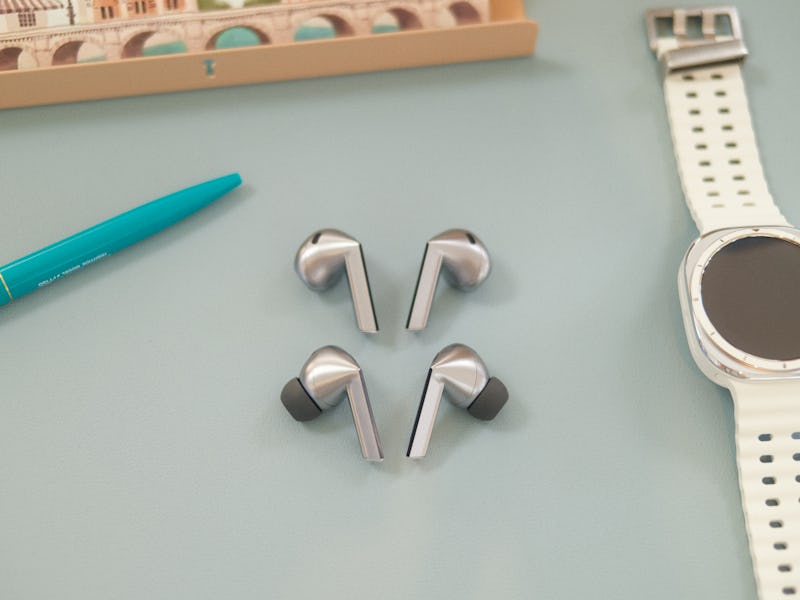Hands-On With Samsung's Galaxy Buds 3 and Buds 3 Pro That Look Like AirPods
Why do these wireless earbuds look... so familiar?

Among all of the new products Samsung announced at Unpacked in Paris, Samsung’s new Samsung Galaxy Buds 3 ($179.99) and Buds 3 Pro ($249.99) might be the most divisive... because of how much they look like AirPods.
Everybody — and I do mean everybody — I spoke to who got a first look at Samsung’s redesigned wireless earbuds said the obvious: the Galaxy Buds 3 and Buds 3 Pro look like AirPods 3 and AirPods Pro 2, respectively.
Samsung, known for making wireless earbuds shaped like beans and marbles, seems to have had a change of heart on the whole stem-less design, as the Buds 3 and Buds 3 Pro have multifunctional “blades.” I’ve not had a chance to listen to the new wireless earbuds, but they sure do look like AirPods, even if they have some unique AI-powered features that you won’t find on Apple’s white buds.
When Nothing launched the Ear 1 wireless earbuds, everyone pointed and said they were just AirPods, but with a partially transparent design. Now, everyone is doing the same with the Buds 3 and 3 Pro — they’re AirPods, but silver (they also come in white, which only makes them look even more like AirPods) and with angular “blades” that can light up.
Similarities aside, Samsung ditching its stem-free Galaxy Buds design is validation that Apple got the design of wireless earbuds correct way back in 2016. It’s not just a design identity, wireless earbuds with stems actually have many advantages, including positioning the microphones closer to your mouth for better call quality; there’s room for larger batteries or more sensors or control inputs; they’re easier to grab to insert and remove from your ears. From a function POV, wireless earbuds with stems are superior to ones without them. But alas, they look like AirPods.
Get over that awkward resemblance, though, and Samsung’s wireless earbuds might actually be worthy of your money. Again, I haven’t listened to them and haven’t done any comparisons with other wireless earbuds, so for now, I can only run down the features that excite me most.
The Galaxy Buds 3 and Buds 3 Pro are similar, but also very different. The Buds 3 have an open-ear design like the AirPods 3, but unlike Apple’s third-gen wireless earbuds, Samsung’s have active noise cancellation (ANC). You won’t get the same tight seal and noise blockage as you will with the Galaxy Buds 3 Pro, which have in-ear tips, but it’s better than no ANC at all.
The Galaxy Buds 3 have a 1-way 11mm driver; the Buds 3 Pro has an “enhanced 2-way 10.5mm dynamic driver and 6.1mm Planar driver. Both wireless earbuds have three built-in microphones and a voice processing unit. Both pairs of earbuds support 24-bit Hi-Fi sound and 360 Audio. On a single charge, the Buds 3 battery lasts up to 5 hours with ANC on and 6 hours with ANC off; the Buds 3 Pro last up to 6 hours with ANC on and 7 hours with ANC off. Both buds are IP57 water-resistant.
Aside from those differences and the ear tips and ear tips-free design, the one feature that earns the Galaxy Buds 3 Pro its “pro” moniker is its Blade Lights. The lighting will turn on when you’re pairing the Buds 3 Pro to a device, when you’re pinching or swiping down on them for audio controls, or when you need to find them if you’ve misplaced them. I don’t believe they display battery levels for each bud, which feels like a missed opportunity.
AI-Enhanced Sound Active Noise Cancellation
With AI being integrated into all of Samsung’s products announced at Unpacked, the Buds 3 Pro also have their own share of AI features. Notably, using AI to detect specific sound changes in your surroundings and then automatically adjust the volume and ANC.
Samsung highlighted a few scenarios where these AI-powered ambient sound detection and “Voice Detect” features could be game-changers. One example is when you’re walking outside and there’s loud construction noise. In detecting loudness, the Buds 3 Pro would increase ANC to better protect your ears. But in a scenario where you’re on the street and a loud alarm or siren goes off the Buds 3 Pro would lower the ANC so you could hear it, and then once the siren or alarm has passed, increase the ANC again to block out the street noise. Similarly, if you start talking to someone, the Buds 3 Pro can lower the ANC and then increase it again when the conversation stops. It’s very much like the Sound Recognition feature for iPhones and iPads, except it’s built right into Samsung’s wireless earbuds.
Another AI feature, for both the Buds 3 and 3 Pro, is the Interpreter. When paired with a Galaxy Z Fold 6 or Z Flip 6 and the Listening Mode is turned on, you can get real-time translations right to your ears.
How well these AI features work IRL will require testing. What I am somewhat both sad and happy to see is that Samsung hasn’t thrown in ChatGPT or an AI chatbot into the Buds 3 series just to be trendy. That being said, while more practical, the use of AI in these wireless earbuds isn’t as cutting-edge as it could be.